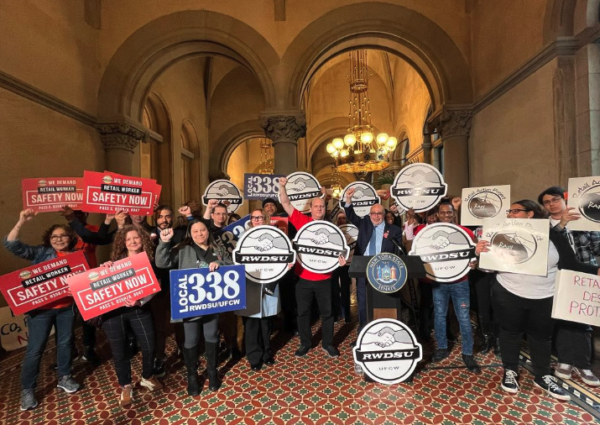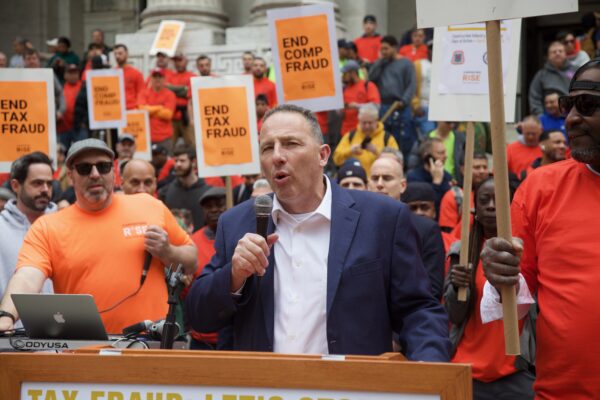November 13, 2014
By Joe Maniscalco
New York, NY – Anxious workers already concerned they don’t have the necessary gear to protect themselves from Ebola, have even more reason to be worried this week. That’s because the virus that has killed almost 5,000 people in West Africa, may be easier to catch than many previously thought.
The Centers for Disease Control, as well as the New York City Department of Health, maintain that transmission of the Ebola virus, first detected back in 1976, cannot be spread through the air, and instead requires person-to-person contact for infection to occur.
But at a special NYCOSH [New York City Committee For Occupational Safety & Health] conference held this week at District Council 37, Professor Lisa Brousseau, an academic researcher and educator specializing in respiratory protection in the workplace, challenged that very premise.
“Everyone always tells you that it’s only direct contact – well, I would tell you that probably is an important feature – but I would actually suggest that we don’t really know,” Professor Brousseau told LaborPress.
The past chair of the American Conference of Industrial Hygienists [ACGIH], said that infected aerosols – like those produced through coughing – can be inhaled near a source.
And in addition to coughing, lots of other things like vomiting and hemorrhaging, can also generate aerosols. Aerosols – droplets suspend in air – are even produced when flushing a toilet, and may arise as a result of medical procedures involving intubation, drug delivery and respiratory support, as well.
“I’m not worried about the general public,” Professor Brosseau added. “The biggest issue I’m most concerned about is healthcare settings and other workplace settings where you might have high exposure to aerosols near the source.”
Those concerns could have a major impact on the use of enhanced personal protection equipment and advanced respirators for both healthcare workers and airport clean up crews who come in contact with suspected Ebola carriers.
Scores of healthcare workers with National Nurses United took part in a job action on November 11 and 12, citing inadequate safety measures in the face of ongoing Ebola concerns. Two more people reportedly died of the disease in Mali this week. At the same time, Dr. Craig Spencer, the courageous New York City physician who contracted Ebola while treating patients in West Africa, was released from Bellevue Hospital after being cured of the disease.
Lisa Baum, Occupational Health and Safety Representative for the New York State Nurses Association [NYSNA] said that there is a “dilemma” when trying to determine the appropriate level of personal protection as it relates to healthcare workers.
“[But] we want to make sure that the same level of protection is used for a suspect [Ebola] patient, as is used for a confirmed [Ebola] patient,” Baum said. “If we don’t know [if a patient has Ebola], we [still] need the highest level of protection.”
Cabin clearers and other airport workers, meanwhile, aren’t getting anything near the level of protection that healthcare workers are getting, no matter what that may be. And the possibility that the Ebola virus may be spread through aerosol transmission, is only increasing the potential danger.
“[Airport workers] have never seen this level of gear, [and] they never expect to see this level of gear,” said Mark Catlin, SEIU health and safety expert.
SEIU [Service Employees International Union] recently surveyed more than 1,000 workers at 10 of the nation’s busiest airports, and found that less than half of them reported receiving any information regarding Ebola from their employer. Moreover, 70 percent said their employer provided absolutely no safety training.
“The responsibility for knowing what kind of personal protection equipment to put on, or how to protect oneself, is not a worker level responsibility,” said Professor Brosseau. “It is an organizational/employer level responsibility.”
According to Professor Brosseau, airport workers cleaning up, or coming into contact with people suspected of having Ebola, must be outfitted with the same level of protection and training as workers in healthcare settings.
The possibility that Ebola can be spread through aerosol transmission is only making that goal more urgent.
“The question of what type of respiratory protection should be issued to healthcare workers and others at risk of exposure to Ebola has to be answered,” said Guille Mejia, District Council 37, AFSCME. “We can’t afford to put our members at risk or to allow employers to put our members at risk.”



